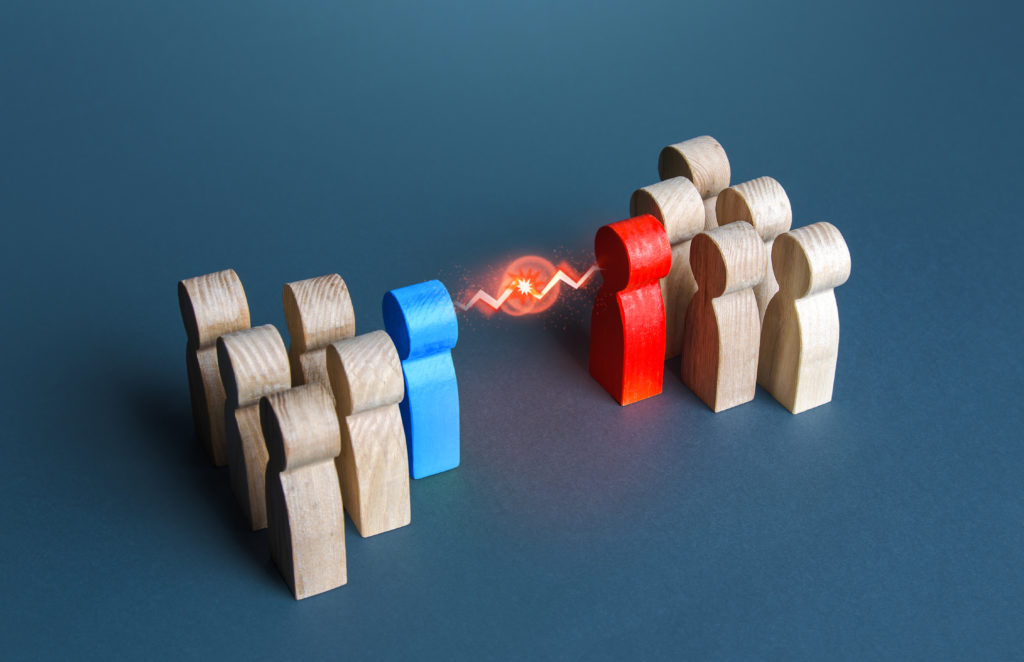Quick Hits
Daily brief research updates from the cognitive sciences

Us vs. them is known as in-groups vs. out-groups in psychology. This is the well-known effect of people being loyal to their own groups and being competitive and often aggressive to the out-group. This happens in multiple groups. Obvious ones are nationalities, religious groups, sports teams, but also geographical regions.
Previous research has shown that we human beings are very good at creating groups and this can be formed very quickly. We also know that these groups, at extreme levels, can be the cause of much of what we consider evil in society, aggression, abuse, murder, torture, and genocide. What may also be surprising, to some, is that all evidence points to this being hardwired i.e. babies as young as 3-months-old exhibit favouritism to in-groups and out-groups and this includes punishing the out-group and rewarding the in-group!
Now researchers at the Virginia Commonwealth University have investigated this effect further and come to some surprising, to some, conclusions!
What did they find?
They put 35 male college students through online competitive aggressive tasks. For this they told they would be competing with participants from a rival university. In fact, they competed against a computer – for ethical reasons. They had their brains scanned while doing these tasks.
What they found that was surprising is that those who were more aggressive against out-group members had greater activation of reward circuits in the brain suggesting that this is driven be reward rather than anger or other mechanisms. Specifically, the nucleus accumbens and ventromedial prefrontal cortex.
This reward circuitry was also associated with the mount they excluded the out-group from other activities. Though this has been measured in other contexts and the research points to this rewarding experience the researchers were most surprised by the strength of the effect in what is a “weak” out-group. A rival university is, in the big scale of things, not a very strong out-group such as the ones that are constructed in a divisive political atmosphere or on the global stage.
So sad to say that reward for punishing others seems to drive, to a large extent, in- and out-grouping and harming others. Fortunately, we now know this and fortunately not everybody exhibits this to excessive degrees●

Andy Habermacher
Andy is author of leading brains Review, Neuroleadership, and multiple other books. He has been intensively involved in writing and research into neuroleadership and is considered one of Europe’s leading experts. He is also a well-known public speaker speaking on the brain and human behaviour.
Andy is also a masters athlete (middle distance running) and competes regularly at international competitions (and holds a few national records in his age category).
Reference
Emily Lasko, Abigale C Dagher, Samuel James West, David Chester.
Neural Mechanisms of Intergroup Exclusion and Retaliatory Aggression.
Social Neuroscience, 2022
More Quick Hits
So, Meditation Doesn’t Change Your Brain – Or Does It?
editation can actually change your brain. "Oh, no it can’t!" say these researchers. "Oh, yes it can!" say a lot of other researchers. Does this start to sound confusing? Well, it does because there has been plenty of evidence that...
The Life Factors that Make Lonely People Lonely
Quick HitsDaily brief research updates from the cognitive sciences ou may assume, logically at first glance, that not having contact to people is the most important factor in loneliness. And obviously this does have a large impact — but...
How Music Helps With Collective Grief
his study recently out analyses a fascinating episode in China at the start of the pandemic. A group of international musicians in Shenzhen produced a viral hit in China. This was a cover version of Michael Jackson's “you are not alone”...
Why it pays for companies to help workers have a good day in the office
usiness and executives in those businesses are more than keen to get a competitive advantage. To this end they invest heavily in technology and getting the right people to do the job. But, I am sure, we are all more than aware that the work...
Vaccination to Keep Your Memory?
Quick HitsDaily brief research updates from the cognitive sciences ho wouldn’t want to keep their memory when aging?! Well, researchers have just announced some promising results in mice enabling them to keep their memories and avoid some of...
Can Having More Children Reduce Cognitive Functioning?
Quick HitsDaily brief research updates from the cognitive sciences aving more children and late life cognition is not something that is generally researched. There are more obvious avenues such as diet, education, exercise, or socio-economic...






